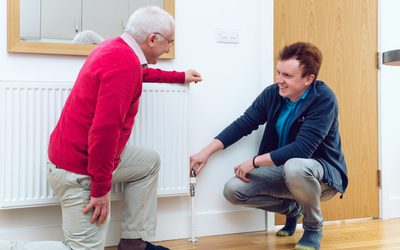- Pec In Action /
- SunPeople
SunPeople
Exploring new ways to reduce carbon emissions from heating.
Alongside Plymouth City Council, we have been selected as partners in an exciting new project from the Interreg France (Channel) England Programme called SunPeople. We are exploring new ways to reduce carbon emissions from heating.

SunPeople is co-funded by Interreg France (Channel) England, a programme financed by the European Regional Development Fund.
What's the Problem with Heating?
In UK, our biggest energy use is for heating, even more than transport or electricity generation. Heating our homes, businesses and industry accounts for 46% of all the energy used in the UK and accounts for 32% of our carbon emissions. Nearly 70% of our heat is produced from natural gas, a fossil fuel. Over three quarters (79%) of the energy we use in our homes is for heating space and hot water, mainly using gas-fired boilers (81%).
Carbon intensity is a measure of how much CO2 emissions are produced per unit of energy used. As we have become more efficient in our use of electricity, this now has a similar carbon content to gas. The carbon intensity of heat needs to be reduced by 90% by 2050 to meet our legally binding targets. Therefore, we need to re-think the way we heat our homes and businesses.
What is a heat pump and how does it combine with solar energy?
A heat pump is a device that takes heat from the ground or air and moves it to another location, such as space in a building or water in a tank. They are able to use a small amount of electricity to generate three to four times the amount of heat. If solar power is used to power the heat pump then we don’t need any fossil fuels to heat our homes!
Unfortunately, these systems are still not so well known in the UK, with a lack of understanding about how to maximise their efficiency through use and maintenance. Whilst heat pumps can have higher upfront costs than gas systems, they can have minimal running costs and low or zero carbon emissions.
What does the project aim to do?
The SunPeople project allows us to explore combining solar energy (photovoltaic and/or thermal) and heat pumps as a heating solution, initially for residential (private and social housing) and commercial premises. It will test the idea of providing an energy service approach, in which all that is required to deliver heat (such as the capital and maintenance costs) are covered by another organisation, to encourage the use of these innovative systems and improve the way we heat space and water.
Using pilot sites in Plymouth and Lorient, the project aims to demonstrate this concept as a cost-competitive, sustainable heat energy service. It includes the development of the optimum technical solution as well as the development of a clear commercial business case. We will engage with a range of market players and stakeholders, from individuals to building owners, supply chains and service providers, to understand the current barriers to implementation and to help develop the best approach. Guidance and resources will be developed for use on other projects.
SunPeople focuses principally on the urban centres of Lorient (Southern Brittany) and Plymouth. There are four partners Agence locale de l’énergie et du climat Bretagne Sud (ALOEN) (lead partner), Aezeo SARL, Plymouth City Council and ourselves.
Expected Results of the Project
The SunPeople Project has provided PEC with a great opportunity to explore technical solutions to deploying heat pumps and solar, develop a business model for heat as a service and to learn from feasibility studies conducted in Plymouth and with our French partners.
There have been a number of interesting findings from the project so far and we are keen to share these with the industry, individuals and businesses, to encourage the decarbonisation of heat. Below we have outlined some of the key expectations and deliverables we hope to see from the project in the coming months.
- To assess and share technical feasibility studies investigating the deployment of heat pumps (ASHP and GSHP) and solar PV.
- To share case studies of heat pump projects with our project partners, the supply chain and individuals.
- To develop a short technical best practice guide for community energy groups, businesses and individuals considering the purchase of a heat pump.
- To create a package of resources for ESCOs to deliver low carbon heating as a service. We hope to provide key legal documentation and a financial model to help community groups develop their project business cases and have suitable legal templates.
- To share case studies via an online event so people can learn from previous projects and ask about the process of delivering a heat pump and solar.
We welcome any interest in the project and encourage people to get in touch to discuss how SunPeople can help them or their organisation.
Catch up on our Webinar
We recently held a webinar to provide an insight into the experiences drawn from low carbon heating projects. It helped viewers to understand what the key considerations are for an installation, what technologies work best and what resources are required to increase the rollout of these projects. The event provided views from homeowners, installers, businesses and communities, and was followed by an interesting open discussion. If you missed it, watch below: